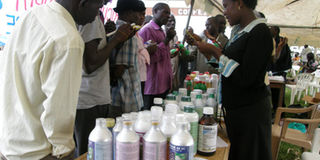Counterfeit agro-inputs high on the market

During an exhibition, an agro-input dealer explains how to spot a fake product. The issue of counterfeiting of such inputs is a cause for concern.
Ten people dealing in counterfeit agro-based products were arrested recently by police in Container Village in Kampala during a routine inspection by ministry of Agriculture officials.
The inspectors, from the Crop Protection Department, impounded a tonne of fake maize seeds plus dozens of sub-standard and or expired agro chemicals. The fake products were mainly expired seeds, seeds with forged labels, adulterated chemicals, seeds mixed with food colour, among others. Early this year, in a similar operation, three dealers arrested and charged.
Stephen Byantwale, an assistant commissioner in the department, said, “Fake and expired drugs and chemicals have been found on the shelves, from where unsuspecting farmers get them only to cause more harm to the health of users, crops and animals.” He explained the operation was to assess the level of compliance by the traders and sensitise farmers on where to get genuine seeds from.
Moses Nangulu, executive director, Uganda National Agro-input Dealers Association, (Unada), notes that close to Shs14b is lost annually through counterfeit agro-chemicals. This is corroborated by a Food and Agriculture Organisation study that revealed that in 2012, Uganda lost Shs13.8b in fake agro-chemicals.
Experts advise that organisations like Unada should be more vigilant to get the best from their businesses. Nangulu, however, adds, “counterfeits in the agro-chemicals business account for 15-30 per cent and the trend is increasing with the quest for commercial agriculture in relation to farmer ignorance.”
“On a critical analysis, the availability of counterfeit herbicides, pesticides, seeds and other agrochemicals on the market means that the health of millions of consumers and farmers is endangered,” observes Komayombi Bulegeya, the commissioner crop protection department in ministry of agriculture.
Mayanja Kato, chairman Container Village agro-input dealers association, says while there are some unscrupulous dealers but also the high demand for cheaper high-end products by the farmers drives the vice higher hence keeps the counterfeiters in a somewhat lucrative business.
Combating the challenge
“It is worth noting that smallholder farmers cannot afford the high prices of some agro chemicals. The most expensive chemicals are counterfeited most. For instance a number of farmers ask for just enough for one or two pumps. Unless the dealer follows principles and ethics of good standards but more often the dealer has no option but to open, say, a one litre container and measure 150mls for the farmer. That’s when and wherethe tendency of diluting with other substances starts.”
In 2012, International Fertiliser Development Centre in collaboration with CropLife and other partners in Uganda introduced ways to reduce counterfeits. Among these was a mobile authentication service. Three products Roundup, Dursban and Mamba (most counterfeited) were stuck with a scratch panel bearing a 12-digit code.
Farmers were required to look for it on the container, scratch and send the code by SMS to 6799 and receive confirmation whether the product is fake or genuine. However, the response was minimal despite the huge sales made.
Experts argue that counterfeiting is a challenge with global reach that spans multiple sectors. Thus the agricultural input sectors in Uganda and Africa in general are not immune. According to a 2014 report from Transparency International looking at the markets in Uganda and Ghana, the global value lost due to counterfeiting in 2013 was estimated to be $1.4b from $775m in 2008. “This challenge is not tied to Uganda alone, it is a global challenge and more to Africa,” said Peter Wandera, executive director Transparency International Uganda.
“In Uganda, the prevalence of counterfeiting is highest within herbicides. Counterfeiting in maize seeds, especially hybrid varieties is also prevalent, but less in herbicides. Smallholder farmers rarely use fertiliser and therefore counterfeiting is not as prevalent as in the other two value chains but remains a recognised issue.”
Common types of counterfeits
Fred Muzir, an inspector from ministry of agriculture, warns of the most common types or signs of counterfeiting. Mislabeling: This is where the label does not reflect contents in the package. This is often with imports.
Label Reuse: Where a premium product’s label is placed on a sub-standard or adulterated products.
Label imitation: Where a premium brand is imitated but the product sub-standard or adulterated. “In seeds, we have found out that it is mostly maize that is counterfeited,” Muzira says. Seed growers, companies, and agro-dealers place grains in the government-issued seed packages, and label them OPV or hybrid varieties.
However, counterfeiting activities in Uganda, according to Transparency international, are a result of four main root causes including the following.
Many points of intermediation along the value chain within Uganda’s agricultural input sector.
It is characterised by a high degree of fragmentation making it difficult for manufacturers to track the product flow along the value chain, and difficult for end consumers to authenticate the source.
Manufacturers of agro-inputs (mostly Europe) are unwilling to invest in African markets and as a result, they do not conduct demand planning, manage inventory, or ensure channel accountability beyond the point at which product is sold to importers.
Consumer ignorance, as it is still difficult for smallholder farmers to determine if a product has been adulterated (diluted or fake) or if it is a sub-standard product (expired or poor quality) based on the label alone.
Labels and packages are tampered with, and the product itself may look and smell like the authentic product.
But also on top of it all, the profit potential of dealing in counterfeit products motivates ill-intentions within actors across the value chain.
Weak enforcement of regulation means that actors who behave illegally are rarely caught and prosecuted. When prosecution occurs, existing fees and punishment do not serve to deter further crimes.




